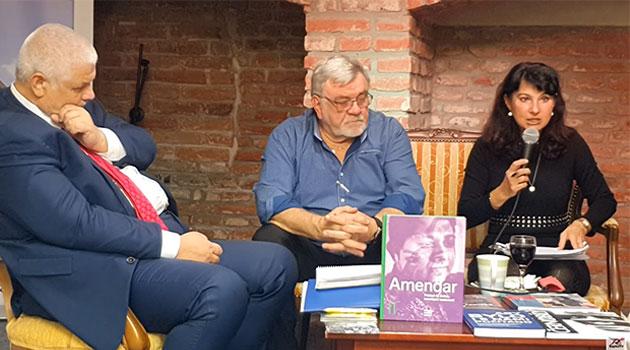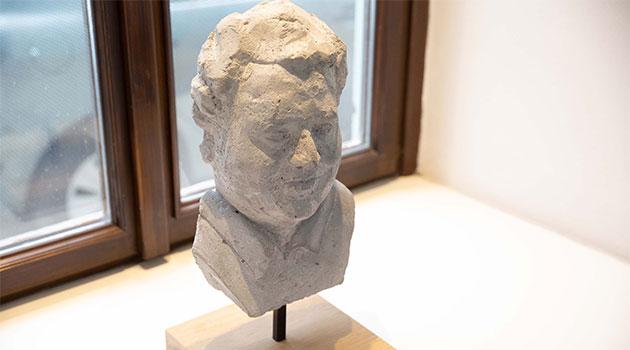Director of the Museum of Romani Culture schools Czech senator in debate

On Thursday, November 2021, a debate entitled “Our Roma” was held at the Slovak House in Prague, organized by the Iron Curtain Foundation (Nadace železná opona). The discussion with the controversial Czech Senator Jaroslav Doubrava was originally meant to involve several panelists: Czech Government Human Rights Commissioner Helena Válková, Czech Public Defender of Rights Stanislav Křeček, Czech MP Jaroslav Foldyna (“Freedom and Direct Democracy” – SPD), or Doc. PhDr. et PhDr. Martin Kaleja, Ph.D., who is a volunteer civil society member of the Czech Government Council for Romani Minority Affairs.
In the end, the only other participant besides the senator was the director of the Museum of Romani Culture, Jana Horváthová, who absolutely controlled the debate and explained immediately at the outset why she was participating in the discussion. “Let’s first prevent any distortions of the facts from happening – I would like to say that I have accepted this invitation because I was informed that my participation and that of docent Kaleja was desired by Dr Helena Válková. She called me this morning to say that she does not agree with this event. I’m from Brno, I already had the trip planned, so that’s why I am here,” she said before presenting the history of the discrimination against Romani people and their rejection in the Czech lands.
Horváthová: The current situation of Romani people is strongly influenced by their historical exclusion
“The current situation is quite strongly associated with the past,” the director said, adding that Romani people were declared illegal in this part of the world from the mid-16th century until the mid-18th century. “Majority groups criminalized the Roma and did their best to see them destroyed,” she said, adding that dating from the time of the Holocaust during the Second World War and their forced assimilation under communist rule, the discrimination and rejection of Romani people persists here to this day.
“It is not until after 1990 that we have been attempting integration, but just de jure. Actual integration has been prevented by many different moments in history,” the director said.
Horváthová also immediately objected to the phrase “Romani issue” used by the moderator of the discussion, the lawyer Karol Hrádela. “That phrase is not the right one. It puts the situation in a negative context, its use signifies how the majority society sees coexistence between Romani people and non-Roma,” she said, adding that whenever we speak about problems or issues, there is always more than one aspect involved, and that therefore it would be most appropriate to speak, for example, about the issue or the problem of Czech-Roma coexistence.
The director said that there are not just “problematic” Romani people, as some posit, but that there are also successful Romani people in the Czech Republic, and she reminded the audience of the book Amendar, which exactly presents the stories of 300 successful Romani people. “Some just see as Romani those who conform to the stereotype that has been created. Anybody who doesn’t meet that description is not discussed. Throughout my lifetime I have heard people say so many times: ‘Madame Doctor, what kind of gypsy are you, you don’t steal, you’re educated?’,” she said of the kind of statement that educated, successful Romani men and women frequently encounter from non-Roma in Czech society.
“Many Romani people have achieved equality here through their own above-average effort, but most of the time it has also involved a significant dose of good luck and the aid of the majority society,” she explained. “If we want to achieve equality for most of the Romani population, then the state has to do something to achieve that. Is that actually what we want, though? Do we genuinely want to integrate Romani people into the center of our society? Or do we just want to eliminate them from the picture so that they will leave us in peace?” she asked at the opening of the debate.
Doubrava: “Gypsies” consider work to be the worst way to make a living
Czech Senator Jaroslav Doubrava reacted to this erudite analysis with stereotypical stories about Romani people living on welfare and their alleged approach to work. “If somebody from that community achieves an education, he immediately does his best to be set apart from the others,” the senator alleged, adding that as a white person he feels that he has been more discriminated against than any “gypsy” in the Czech Republic.
“I don’t want you to get the impression that I am a priori against the gypsies. I am against those who abuse the system and who consider work to be the worst way to make a living,” said the senator, who consistently used the terms “gypsy” and “gypsies” throughout his performance.
The senator claimed to have interviewed two Romani people who told him that they do not see anything derogatory about the term “gypsy man” or “gypsy woman” in Czech (cikán, cikánka). “They’ve been ‘Roma’ since ’73, when they assembled at some kind of potlach and agreed to no longer be gypsies, but Roma,” Doubrava said, demonstrating his ignorance of historical facts.
Horváthová then responded to some of the senator’s tales about Romani people and their alleged inferiority. “It’s necessary to look at all of this from a scholarly background. For 15 years our museum tutored Romani pupils, and even though their parents were semi-literate or even illiterate, because in our system they never got their education, we always had about 20 % more parents whose children we couldn’t provide tutoring to because we never had enough capacity,” she explained.
Horváthová: “Rom” is a much older word than “gypsy”
The director then explained the concepts of “Rom” and “gypsy”, as well as which term is of greater antiquity. “In Romanes, the word ‘Rom’ has always had a place. That term comes most probably from ancient India. The age of the word ‘Rom’ cannot be compared to that of the term ‘gypsy’,” she said, adding that the label of ‘gypsies’ was given to Romani people by non-Roma and always has a negative connotation.
“Whoever wants to show even a little bit of class, then please, when you are in contact with Romani people, do not use that term,” Horváthová said, illustrating the negative connotations of the word “gypsy” with a quote from a book by Elena Lacková, the Romani author of the autobiography Narodila jsem se pod šťastnou hvězdou (English title: A False Dawn). The debate was then joined by the director of the Slovak House in Prague, Vladimír Skalský.
“We should avoid stereotypes, because they are simplifying and that, in my view, is where racism begins. If we generalize some characteristic and attribute it to somebody, that is the start of racism and discrimination,” he said, clearly referencing the introductory remarks that had been made by the senator.
“We may be advising Romani people to ‘Get a job’, but try, as a Romani man, to apply for one in some company here. You’d have to be ten times better than anybody else,” Skalský said, adding that he clearly is in favor of using the term “Roma”.
“I am in favor of using the terminology that members of this ethnicity say suits them and does not offend them,” Skalský added. The discussion then revolved several times around the use of the word “Roma” or “gypsy”, and the subject took up a relatively large part of the time available for the entire debate.
“As far as the expression ‘Rom’ goes, it is not in Otto’s Encyclopedia,” Senator Doubrava said, in an attempt to smash the arguments that had been made by Horváthová. She quickly schooled him on that front: “That’s just it, though. At the time that encyclopedia was being written, the Romani minority was isolated away from the rest of the public, who just used the terms they already knew. Today we all want integration. If we want to integrate the Roma, if we want to have them among us, then let’s attempt to be correct when we speak about them and make it apparent to them that we value them at least somewhat.”
Horváthová: The integration of Romani people depends on politicians
Doubrava responded to that argument by telling a story about a “Romani garbage dump” in Ústí nad Labem and attacking nonprofit organizations, alleging that those involved in such work had never explained to the Romani people living in that particular place that it is wrong to throw garbage out the window, and Horváthová responded by saying it is too easy for people to keep telling stories of that kind, from both points of view, over and over again. “Let’s address the root causes,” she implored, explaining what the causes are of children who are Romani and from socially disadvantaged environments failing in the schools.
“Segregation is an enormous problem. This society is not addressing segregation,” she said, adding that the education provided in the segregated schools is of a significantly lower standard than the education provided in other schools.
“Politicians are the driving force behind change. Integration depends on politicians,” she declared, recalling that such integration has never been a main point in the program of any previous administrations in the Czech Republic and that all that has been done has been to “put out fires”.
“All big political parties know that if they were to put the integration of Romani people into their program it would repel the voters,” she added. She then responded to the senator’s attack on nonprofit organizations.
“The nonprofits are just a drop in the ocean. They are not the ones that can adopt systemic solutions,” she said.
The museum director then reproached Doubrava for just looking at the surface of the whole subject without any background or education in these matters. “Education about this subject is needed,” she said.
The Czech Republic’s social welfare system is demotivating
The debate then turned to the social welfare system in the Czech Republic. “At the museum it is a problem for us to employ a Romani person who is already drawing welfare, because he will receive more money in benefits than he will from a state-scheduled salary. Naturally that’s wrong,” the museum director said.
“The social welfare system should be motivating, but that is not the fault of the weak or the needy who are taking advantage of this, it’s a flaw of the system. The integration of Romani people is about policy and politics, and the integration of Romani people is not happening, systemic solutions are not being set in motion,” Horváthová responded to the senator’s reproaches that Romani people “abuse” welfare.
Doubrava then quoted a interview he conducted with the head of the social welfare department in Ústí nad Labem and published in his book, and also told a story from his days as mayor. “They don’t want to work and the system is to blame for a situation that has facilitated their parasitism with impunity on those of us who do work,” he concluded.
“Many unemployed people, socially excluded people, do not want to get jobs because they know how to count, and working under the table while drawing benefits yields them more money. That’s not their fault, though, it’s a flaw in the system, and it bothers me just as much as it bothers you,” Horváthová reiterated.
In conclusion, the museum director emphasized the necessity of non-Roma and Roma getting to know each other and the need for everybody to study, to read scholarly journals, and to stop repeating myths and stereotypes about Romani people. “The sharing of stories and taking an interest in each other is important,” she said at the end.
